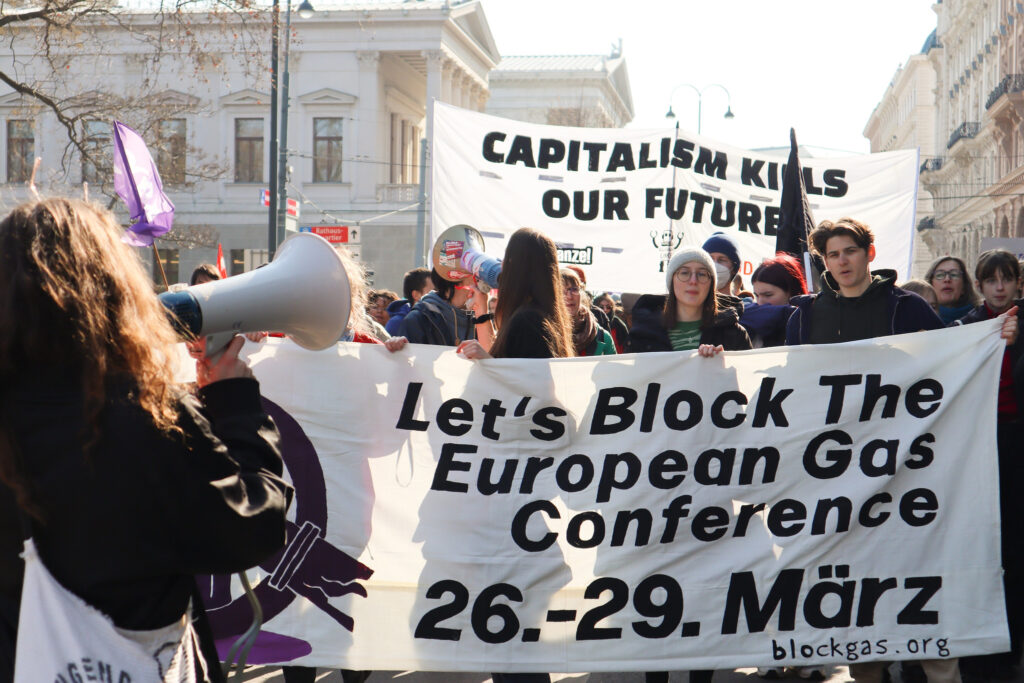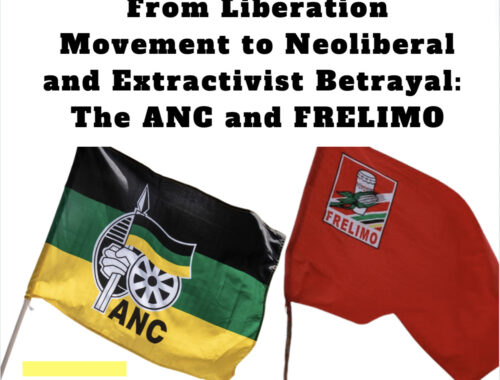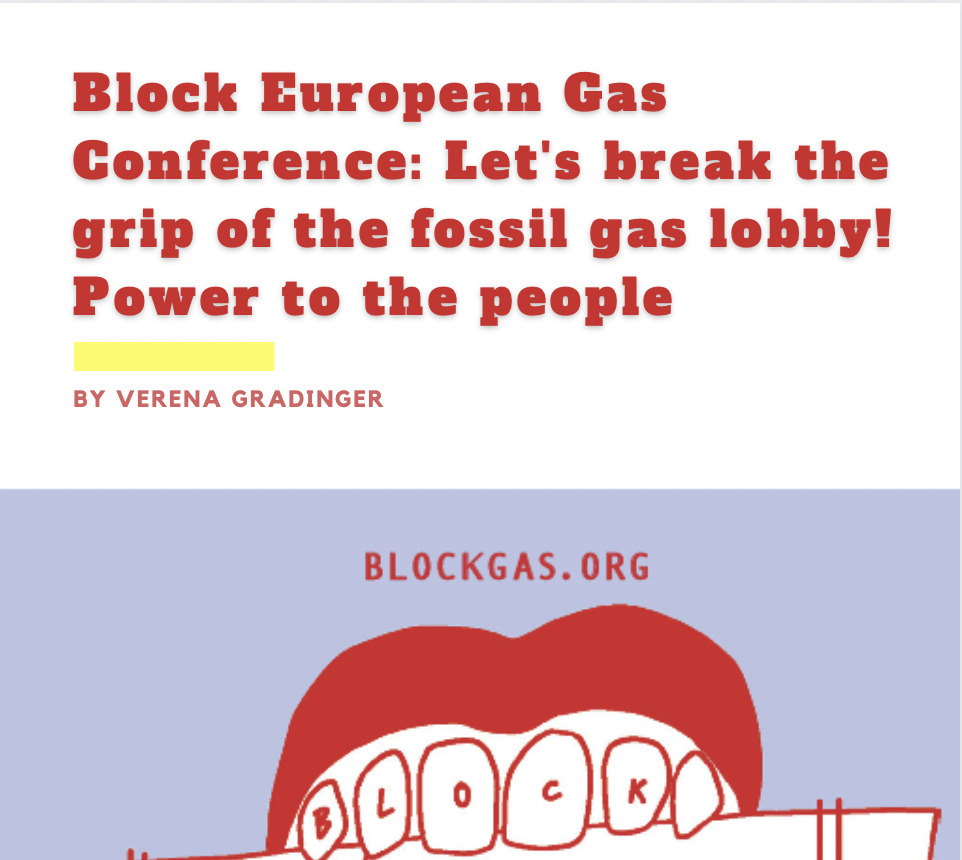
Block European Gas Conference: Let’s break the grip of the fossil gas lobby! Power to the people
From the 27th until the 29th of March, Vienna becomes the centre of attention for the European climate movement. At the European Gas Conference, all important players in the gas industry come together with politicians and investors to “promote dialogue between Europe and its main suppliers”. Behind closed doors, top lobbyists will hold their private meetings in order to advance and settle deals on new fossil infrastructure that will make Europe dependant on gas for decades to come. There, they will discuss projects such as new pipelines all across the continent and beyond, the expansion of LNG terminals and the promotion of hydrogen as a “green” source of energy. Whilst many of these projects face huge criticism and resistance on the ground, at the European Gas Conference companies and investors have been coming together without much attention from media and local critics for years. An alliance has formed across Europe to make sure that this year will be different. We see this conference as a central leverage point in our fight against the expansion of fossil infrastructure.
Focusing our fight on energy infrastructure
Energy is what keeps our economy going and growing. Through the usage of fossil-intensive energy, not only have we entered a new stage of exploitation of nature, but also of humans. Fossil energy has made it possible to increase productivity whilst
at the same time decreasing the need for human labour power. This is the fundamental basis of the capitalist economic system as we know it today.
This makes the energy sector a strategically valuable point from the perspective of climate activists. If we are to solve the climate crisis, we have to ask ourselves three questions:
- Where do we get our energy from?
- Who uses energy and what for?
- Who decides that some get more access to energy than others?
This is where the question of infrastructure becomes pressing. As long as there is no sufficient infrastructure for renewable energy, calls for individual behavioural change will be worth little more than a band-aid trying to fix a broken bone. At the same time, the millions and billions that have been spent in fossil infrastructure prove to be a serious obstacle in our fight against climate change. Once they are in place, they promise to be lucrative for years. If they are to be shut down early, this means huge losses both for the companies operating them and the financial sector betting on profits and dividends. This is why we must resist the construction of new fossil infrastructure with all means necessary.
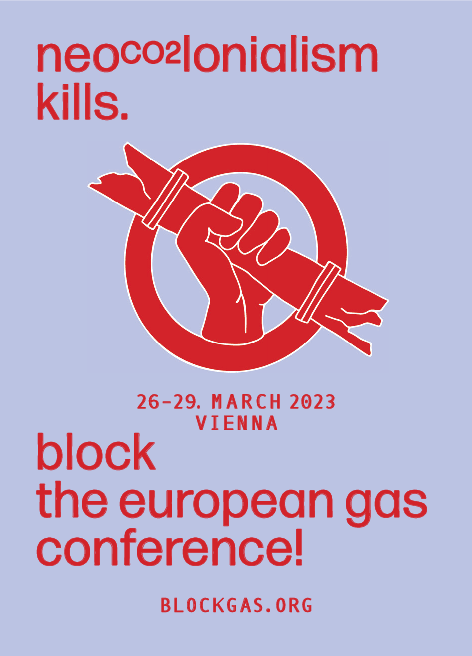
To focus on (energy) infrastructure also means acknowledging that it is in the sphere of production and productive capacities where changes are most pressing in order to reduce the amount of CO2 emitted. Calling for “system change” means calling for a fundamental change in the way our energy is produced and then used across industries in the productive sector.
Over the last few years, the climate movement in Europe has focused its fight against fossil infrastructure at on-the-ground action at so-called “places of destruction”, where big infrastructure was already in place or in the process of being built. This strategy has had the advantage of showing people the enormous destruction that fossil companies are causing around the world, by bringing pictures of large coal pits and power plants onto peoples TV and smartphone screens. However, it is also necessary to include in our strategy those projects that have not been built yet.
The Cost-of-living crisis increases the importance of energy for our fight
As has rightfully been pointed out in this magazine before, the current “cost-of-living crisis” is far from unpreventable. Rising energy bills and food are still the main drivers of inflation in the Euro zone. To understand the fundamental role that fossil fuel prices play in this, it is worth noting that the EU uses about 25% of its gas consumption in agriculture and food production. Both food and energy costs are sectors in which price changes disproportionally affect those who already struggle to meet their basic needs, which is why the current inflation hits them the hardest. This is why many people have started to name the current phenomena “fossilflation”, drawing analogies to the oil crisis and implicating that it is our all-encompassing dependency on fossil fuels that makes us particularly vulnerable to sudden price surges and their consequences.
Whilst many struggle to pay their bills this winter, energy companies are making record profits. Shell has just reported that they have doubled their profits to $40 billion in 2022. BP has made “all-time high” profits of $27.7 billion. In the light of the current situation, discussions around windfall taxes and price controls have been growing in many countries. However, so far there seems to be no political power willing to implement these measures on a larger scale. The so-called “Iberian exception”, put into effect in Spain and Portugal seems to be the only policy that at least partly shows possible short-term solutions to the crisis. Still, both countries show little initiative to tackle the underlying problems and put an end to our dependency on fossil energy – especially when it comes to gas. Meanwhile, the price caps on gas discussed by the European Commission amount to little more than a nice publicity stunt. Opponents of measures that would limit energy companies profiting from the war (and wild speculation on the market) argue that the profits currently made should instead be used to ensure a rapid transition towards renewable energies. So far, one keeps on waiting for these investments in vain.
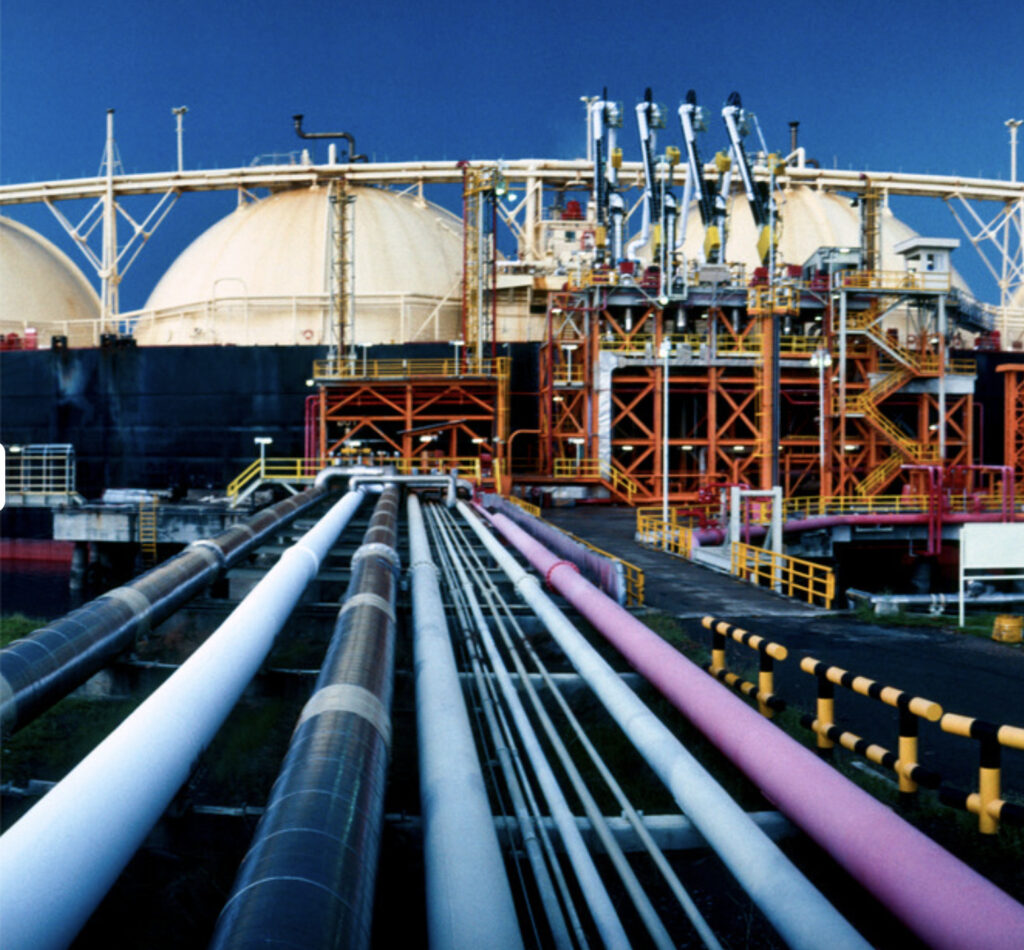
Instead, since the beginning of the war in Ukraine, the fossil industry has launched a massive campaign to take advantage of the situation. Using the argument of independence from Russian oil and gas, they now call for an even bigger and faster expansion of gas infrastructure such as LNG terminals and pipelines. Europe is facing a massive increase in fossil infrastructure projects, many of which have originally been shelved due to climate concerns before the war. We now see a push from the fossil industry to increase capacities for LNG terminals and build new gas pipelines across the continent and beyond. At the same time, certain players are using the current situation to try and keep coal and oil in business for longer – or even bring it back in places where power plants and mines have already been shut down.
Inflation is in its core the consequence of a distributional conflict between different fractions of society, leading to a redistribution of wealth. Even some rather conservative economists are starting to acknowledge that this is what is currently the case. For the climate movement, this means that our fight against energy companies is also a question of class conflict, currently being carried out at the back of workers.
This conflict has different consequences in different countries. Whilst in some countries, governments have been spending huge amounts of money to mitigate the impacts of rising energy bills, this has not been the case everywhere. At the same time, the “solutions” to the crisis implemented in some European countries have made the situation in many other parts of the world even worst, for example in Asia, where the buy-up of LNG by countries like Germany has led to a significant shortage in gas available. However, this does not change the fact that all over the world, we can see clear differences within countries on who suffers from the crisis and who doesn’t.
Connecting struggles
We see crises are an integral part of capitalism that will only become more frequent in the future due to the impacts of climate change. Likewise, we see the inability of a profit driven economy to find adequate solutions in the wake of the imminent climate crisis. While this crisis has many faces, our enemy stays the same: it is the global capitalist class that ties us to fossil energy and raises our bills. That continues to exploit us at the workplace and destroys our environment. Therefore, overcoming the capitalist system must be our main goal as a climate movement that fights for and with workers, women and racially discriminated people.
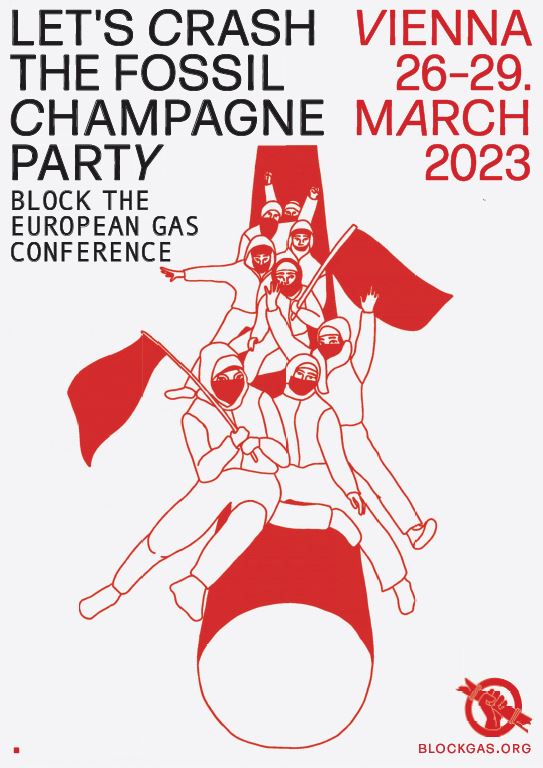
This should however not mean that there is nothing that can be done against the current situation. Crises can also be seen as moments of weakness for those in power and their legitimacy. It is therefore our responsibility to use moments like this to step up and present alternatives. The energy crisis has made the true cost of cheap fossil energy visible for the first time for many Europeans. This offers an opportunity to connect our fights with many people that have not seen climate as an issue so far. It is our responsibility as the climate movement to make clear that the issue of climate change is one that is fundamentally rooted in class struggle. We need to fight together with those who are most affected by the crisis.
This means fighting for affordable and clean energy. This means having discussions on how our energy systems should be organised. It also means having discussions about the amount of energy we can use as a society and who gets to use energy and what for.
The role of the EU in current infrastructure expansion plans
The current situation also raises the question of democracy and accountability. Currently, the energy market at times seems so complex that even experts struggle to explain both it’s functionality and (price) dynamics when pressed about it critically. Prices for energy are calculated for and by the companies trading them on the financial market, using secret computer algorithms that aren’t monitored by any independent agency whatsoever. Calls for measures against ever-rising prices have in many cases been dismissed by national governments with the claim that “nothing can be done”, and if anything could be done, it would be the responsibility of the EU to do it. Whilst there might be some truth in this argument, at least from a legal perspective, the European Commission has a long history of serving pro-business interests and being reluctant on legislation necessary to tackle climate change. There are many structural reasons for that. But there are also very concrete companies spending huge amounts of money and people whose job it is to make sure that the interests of the fossil fuel industry are well represented when the Commission makes decision. “Well represented” of course also means much better represented than the interests of ordinary people. One of the most striking examples of this is the Energy Platform’s “Industry Advisory Group”, which is supposed to advise the Commission on their way to reduce the EUs dependency on Russian gas and even monitor its joint purchasing mechanism, which effectively translates to companies overseeing whether countries are buying the right amount of gas from them. In the past, the gas industry has successfully proposed a strategy that includes both renewables and gas in the European plans for their future energy mix.
Accordingly, the REPowerEU plan by the European Commission has the intention of making Europe less dependent on Russian oil and gas – not oil and gas in general. While the official target for renewable energy for 2030 has been raised to 45%, the European Commission’s saving proposals are to switch off your lights and heat your houses less. They don’t mention that more than half of Europe’s gas is used in industry. They also don’t mention that expansion plans for gas infrastructure have increased when compared to previous years.
Fossil industries are using the current political insecurities to bring back infrastructure projects that social movements and science had swiped off the table in the last couple of years. Amongst those projects are expansions of the highly contested TAP Pipeline or MidCat Pipeline, the LNG terminals in Brunsbüttel and Wilhelmshaven and many others.
Once this new infrastructure has been built, it will become even harder to accomplish a clean energy transition. At the same time, gas is causing massive destruction in the areas where it is produced. Current plans by the European gas industry in the Global South threaten to extend colonial injustices by exploiting local resources, dispossessing their communities and irreversibly damaging ecosystems.
The European Gas Conference
Decisions to maintain and lock us onto our fossil-fuel driven capitalist system are made behind closed doors at events like the European Gas Conference. This March, the European Meeting of the “Gas Council” – a global network of senior energy lobbyists and financial investors, will take place in Vienna. At the European Gas Conference, gas companies, financial institutions and politicians come together to settle on the future of our energy bills and the planet. There, the CEOs of all the big names from Shell to BP, Total and RWE come to Vienna at the invitation of Austria’s second biggest polluter and climate killer, OMV. In addition, the big European gas companies Enagás, Fluxys and Snam are represented. At the conference they meet with big financial investors such as BlackRock and high-level European politicians. The website even proudly announces more than 100 private meetings for the lobbyists. While there is hardly any public record on the results of last years’ conferences, we know so much: at the European Gas Conference 2022 the “end of Russian gas in Europe” was discussed, as was the “rise of LNG”. This tells us that behind closed doors the gas companies, investors and politicians settle for diversification of gas instead of reduction, more gas from the global South with all the impacts of extractivism as well as LNG and hydrogen expansion instead of renewable energy.

Where does this lead us? To more fossil dependency, to high energy bills and less capacity to tackle the climate crisis. Further, if we look at the gas companies present at the conference and the big infrastructure projects currently being discussed – we don’t need a lot of imagination to figure out what the companies and financial investors are talking about behind closed doors. The Re:PowerEU Plan is the framework for these infrastructure projects.
For Europe, becoming independent from Russian gas also means exploiting more resources from the global South – especially in Asia and Africa. Both by extracting gas and then transporting it via boat or pipelines, social and environmental injustices are being done in addition to the accelerated impacts of the climate crisis in the global South through more Co2 emissions in the global North. It is our responsibility to raise our voices in central Europe where decisions are being made that affect those living in areas where the climate crisis is already causing death and destruction. Projects are being built for the profits of European companies at the cost of marginalised communities and the environment, leaving those areas at even higher risks for natural catastrophes and conflict.
These are all projects that social movements have been and are fighting against on the ground. Now the same companies come together to Vienna to avoid publicity and decide on our future without much attention from media and local critics. We won’t let that happen. We must now put an end to this climate destruction, energy injustice, and neo-colonialism.
People from all over Europe and beyond are coming together in Vienna at the end of March during the European Gas Conference to say: Power to the people, down with corporations, overcome capitalism!
